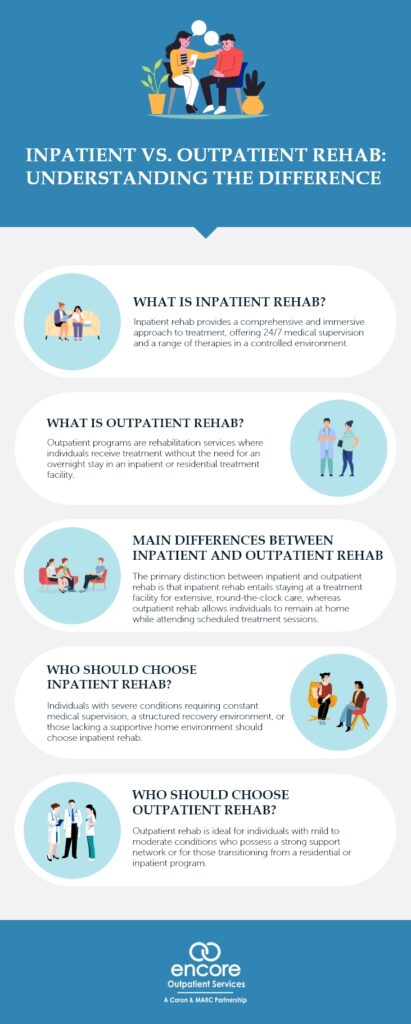Our dedication lies not just in treating symptoms but in addressing the root causes, offering a holistic approach that integrates the best of therapeutic practices with the warmth of community support.
Inpatient vs. Outpatient Rehab: Understanding the Difference

Recovery from substance use or mental health disorders is a personal journey that requires careful consideration of various rehabilitation options. Among the crucial decisions individuals face is choosing between inpatient and outpatient rehab, two approaches with distinct levels of structure and support. This article sheds light on the key differences between inpatient and outpatient rehabilitation, offering a comprehensive understanding of their benefits and suitability for each individual seeking recovery. By exploring the unique features of each modality, we wish to equip individuals and their loved ones with the knowledge necessary to make informed decisions that align with personal preferences, treatment goals, and the complexities of their unique circumstances.
What Is Inpatient Rehab?
Inpatient programs are a form of rehabilitation service where individuals receive treatment in a medical or clinical setting. Inpatient rehabs require the patients to reside at the facility for a certain period of time. This type of rehabilitation is designed for those who require a structured and intensive program, often due to the severity of their condition or the need for close medical supervision. The treatment at an inpatient rehab typically includes a combination of the following:
- 24-hour medical attention and care
- Medically-assisted detoxification
- Mental health counseling and therapy sessions
- Social support and community engagement
These services are available around the clock, providing patients with constant access to healthcare professionals. The duration of inpatient rehab can vary, typically ranging from a few weeks to several months, depending on the individual’s specific needs and progress.
Inpatient facilities are equipped to handle a wide range of conditions, including substance use disorders and/or mental health conditions. The environment in these facilities is controlled and free from everyday stressors and triggers, which can be particularly beneficial for those in the early stages of recovery.
One of the key aspects of inpatient rehab is the structured routine. Patients engage in scheduled activities and therapies throughout the day, which helps to establish healthy habits and coping strategies. This structure is crucial for individuals who need help in creating a stable and supportive environment for recovery.
What Is Outpatient Rehab?
Outpatient programs are rehabilitation services where individuals receive treatment without the need for an overnight stay in an inpatient or residential treatment facility. This type of rehab is tailored for those who have mild to moderate rehabilitation needs, a strong support network, or for those transitioning from a residential or inpatient program. Outpatient care is a flexible approach to treatment that allows individuals to maintain their daily routines, such as work or school, while attending scheduled treatment sessions during the day and returning home afterward. These therapy sessions occur at regular intervals – this could be daily, several times a week, or weekly, depending on the specific program and the individual’s needs. These sessions can include individual counseling, group therapy, family therapy, psychotherapies, and educational workshops, among other treatments.
There are three levels of outpatient care: Partial Hospitalization Program (PHP), Intensive Outpatient Program (IOP), and General Outpatient Program (GOP). Partial hospitalization programs are specialized treatment programs developed for those who need extensive therapeutic intervention, equivalent to inpatient care, but do not require 24-hour supervision. Intensive outpatient programs, on the other hand, are addiction treatment programs that offer structured therapy and support but with a lower time commitment compared to PHP. General outpatient programs offer the least intensive form of outpatient treatment. It involves fewer hours of treatment per week and is suitable for individuals who require minimal support and supervision.

Main Differences Between Inpatient and Outpatient Rehab
The primary distinction between inpatient and outpatient rehab lies in the setting and intensity of the treatment. Understanding these differences is crucial for making an informed decision about the most appropriate form of rehabilitation.
- Treatment Setting – An inpatient rehab requires patients to reside in a facility that offers a controlled environment conducive to recovery. Outpatient rehab, on the other hand, allows patients to live at home or in a sober living environment while attending treatment sessions at a rehab center.
- Intensity of Treatment – Inpatient rehab programs are typically more intensive, with round-the-clock care and a structured schedule of therapy and activities. Outpatient rehab programs offer more flexibility, with treatment sessions scheduled around the patient’s personal and work life.
- Duration of Treatment – The duration of inpatient rehab is typically shorter but more concentrated, ranging from a few weeks to several months. Outpatient rehab programs can extend over a longer period, with the frequency and duration of sessions varying based on the individual’s progress and needs.
- Level of Supervision – An inpatient rehab facility provides constant medical supervision and immediate access to healthcare professionals, making it suitable for those with severe conditions. Outpatient rehab involves less direct supervision, relying more on the individual’s ability to manage their condition in a less controlled environment.
- Cost Considerations – Inpatient rehab generally involves higher costs due to the comprehensive care, accommodation, and facilities provided. Outpatient rehab is often more affordable, as it does not require residential accommodation and utilizes fewer resources.
- Lifestyle Impact – Inpatient rehab requires a temporary withdrawal from daily routines and commitments, focusing entirely on recovery. Outpatient rehab allows individuals to continue with their regular activities, such as work or school, while receiving treatment.
Both inpatient and outpatient rehabs serve the common goal of aiding individuals in their recovery journey, yet they do so in distinct ways to cater to different levels of need, lifestyle constraints, and personal preferences. The choice between them should be based on a thorough assessment of the individual’s condition and a healthcare professional’s recommendation.
Benefits of Inpatient Rehab
Inpatient rehab provides several key benefits that are crucial for individuals seeking intensive care and support for substance use disorders and/or mental health disorders. Here are some of the key benefits of inpatient treatment:
- Structured Environment – Inpatient rehab offers a highly structured environment, free from the distractions and triggers of everyday life. This setting helps patients focus solely on their recovery without external pressures or stressors.
- Medical Supervision and Support – Patients in inpatient rehab have round-the-clock access to medical professionals and therapists. This constant support is especially beneficial for those with severe conditions or during the early stages of recovery, as it ensures immediate attention in case of emergencies or difficulties.
- Comprehensive Care – Inpatient programs provide a multidisciplinary approach to treatment, including medical care, psychological therapy, physical activities, and nutritional support. This holistic approach addresses all aspects of an individual’s health and well-being.
- Peer Support – Being in a facility with others who are facing similar challenges can be incredibly supportive. This communal aspect fosters a sense of understanding and camaraderie, which is instrumental in recovery.
- Reduced Risk of Relapse – The controlled environment of inpatient programs minimizes the risk of relapse during treatment. Patients are away from environments or situations that may trigger a return to harmful habits or conditions.
- Focus on Personal Development – With fewer distractions, inpatient rehab allows patients to focus on personal growth and self-discovery, leading to deeper insights and long-term behavioral changes.
- Establishment of Healthy Routines – The structured nature of inpatient rehab helps in establishing healthy routines and habits, which can be vital for maintaining recovery after the program ends.
Inpatient rehab offers a comprehensive and immersive approach to recovery, making it a suitable option for individuals needing a higher level of care and support during their recovery journey.
Benefits of Outpatient Rehab
Outpatient rehab provides several significant benefits, making it a viable option for many individuals seeking rehabilitation services. Some of the main advantages of outpatient treatment programs include:
- Flexibility and Convenience – One of the primary benefits of outpatient rehab is its flexibility. Patients can schedule therapy sessions around their personal and professional responsibilities, allowing them to maintain their daily routines, including work, school, and family commitments.
- Real-world Application – Outpatient rehab enables patients to immediately apply the coping strategies and skills learned in therapy to real-life situations. This ongoing application can reinforce learning and aid in long-term recovery.
- Support from Personal Networks – This type of rehab allows individuals to stay in their home environment, meaning they can receive continuous support from family and friends. This support network can play a crucial role in the recovery process.
- Cost-Effectiveness – Generally, outpatient rehab is less expensive than inpatient rehab, making it a more budget-friendly option for many patients.
- Continuity of Life – Patients in outpatient rehab can continue with their regular life, including maintaining their job or education, which can be beneficial for their mental well-being and sense of normalcy.
- Gradual Transition – For those transitioning from a residential or inpatient setting, outpatient rehab can provide a gradual step-down approach, helping to manage the transition while still receiving necessary support and treatment.
Outpatient rehab offers a flexible, practical approach to treatment. It provides a balanced way to receive therapy while integrating it into the complexities of everyday life.
Who Should Choose Inpatient Rehab?
Determining whether to opt for inpatient rehab depends on several individual factors. Inpatient rehab is generally recommended for certain individuals based on the nature and severity of their condition, as well as their personal and environmental circumstances.
- Individuals with Severe Conditions – Those who have severe conditions often benefit from the intensive care and structured environment provided by inpatient rehab. This includes individuals dealing with severe addictions and acute mental health disorders.
- Those Requiring Medical Detoxification – Inpatient rehab is suitable for individuals who need a medically supervised withdrawal process, a critical first step for those recovering from substance use disorders.
- People with Limited Support at Home – If an individual lacks a stable or supportive home environment conducive to recovery, inpatient rehab can provide the necessary structured and supportive setting.
- Individuals Prone to Relapse – Those who have a history of relapse may find the controlled environment of inpatient rehab more effective in preventing recurrence, particularly in the early stages of recovery.
- Those Seeking to Escape Daily Triggers – Individuals who live in environments filled with stressors or triggers that may hinder the recovery process can benefit from the controlled setting of inpatient rehab.
- People Looking for Intensive Therapy and Support – For those who would benefit from having round-the-clock access to medical professionals, a peer support system, and intensive therapy, inpatient treatment is a suitable choice.
Inpatient rehab is not a one-size-fits-all solution but is particularly effective for those who need a highly structured, intensive, and supportive environment to address their rehabilitation needs. It’s always advisable to consult with healthcare professionals or addiction specialists to make the best decision based on individual circumstances and needs.
Who Should Choose Outpatient Rehab?
Outpatient rehab is a suitable option for many individuals, depending on their specific situation and needs. It’s particularly recommended for those who meet certain criteria, which include:
- Individuals with Mild to Moderate Conditions – Outpatient rehab is often a good choice for those with less severe conditions who don’t require intensive supervision or a highly structured environment.
- People with Strong Support Systems – Those who have a strong supportive network of family and friends can benefit from outpatient rehab, as this support can complement the treatment received during therapy sessions.
- Those Needing to Maintain Daily Responsibilities – Outpatient rehab is ideal for individuals who need to continue with their work, education, or family commitments, as it allows them to schedule treatment sessions around their daily routines.
- Patients in Transition – Individuals transitioning from a residential program or inpatient setting may benefit greatly from a PHP or an IOP program. Due to their similarity with inpatient care, patients are able to adjust more smoothly to the changes in daily life.
- Individuals Seeking Flexibility – Outpatient rehab provides more flexibility than inpatient programs, making it a good option for those who prefer or require a less structured approach to rehabilitation.
- Those Seeking to Apply Recovery Skills in Real-Time – Outpatient rehab allows individuals to immediately apply the coping strategies and skills learned in therapy to their daily lives, providing a real-world context for their recovery journey.
Choosing outpatient rehab is a decision that should be based on an individual’s specific health needs, personal circumstances, and lifestyle considerations. It’s advisable to consult with healthcare professionals or addiction specialists to determine if outpatient rehab is the most suitable option for you.
Encore Outpatient Services is committed to delivering comprehensive and individualized treatment for substance use disorders and co-occurring disorders. Our facility uniquely offers a range of care levels, including partial hospitalization, intensive outpatient, and general outpatient treatment, all at one location. This integration of services facilitates a seamless transition for patients as they progress through different stages of change and recovery.
Our dedicated treatment team focuses on providing personalized care tailored to each individual’s needs. By employing a combination of evidence-based therapies and innovative interventions, our skilled professionals are equipped to guide patients effectively on their road to recovery.
At Encore, we understand the importance of adapting to the evolving needs of our patients. Whether you are taking the first step in seeking help or moving forward in your recovery process, we are here to support you with the right level of care. Our commitment is to ensure that every individual receives the attention and care necessary for a successful recovery journey.
For more information or to begin your path to recovery, we invite you to contact Encore Outpatient Services. Let us help you take the next step towards a healthier, substance-free future.
Let Us Support You On Your Recovery Journey!
Copyright 2025 Encore Outpatient Services | All Rights Reserved



